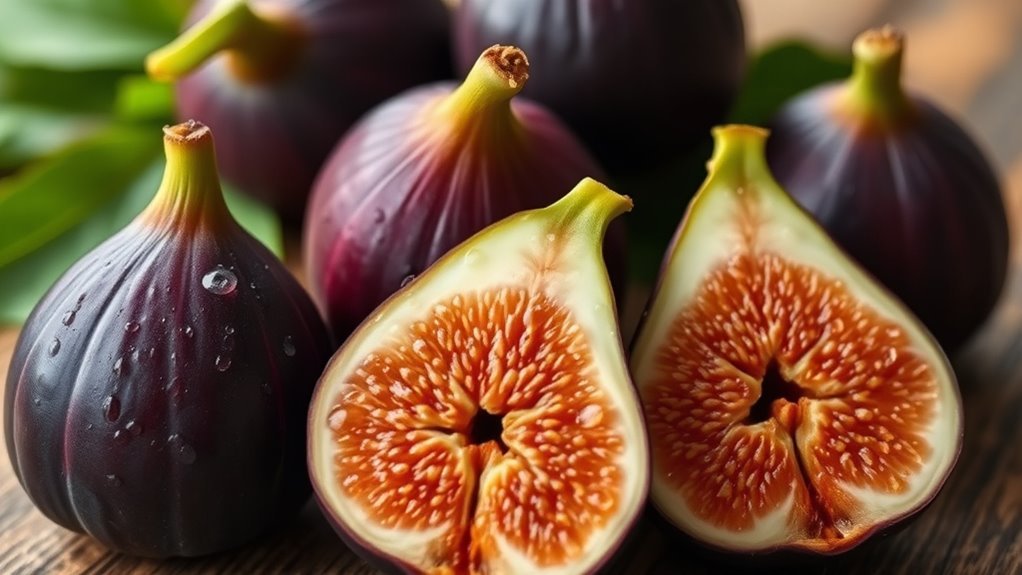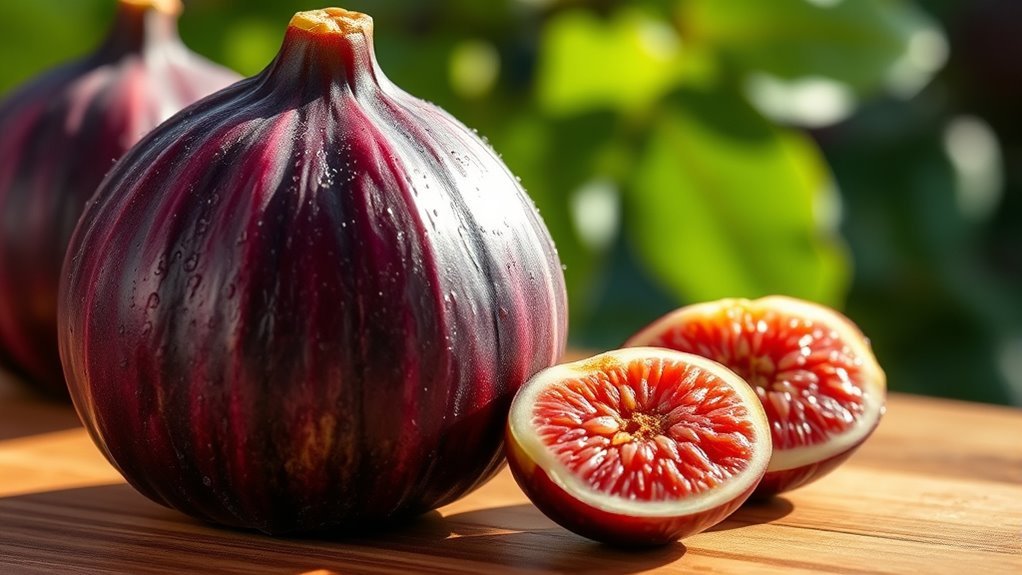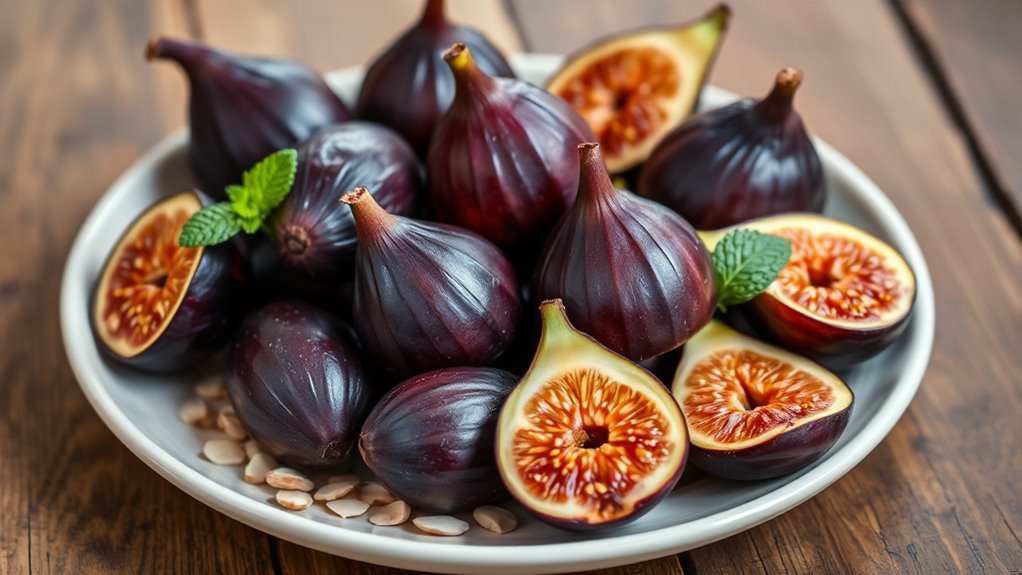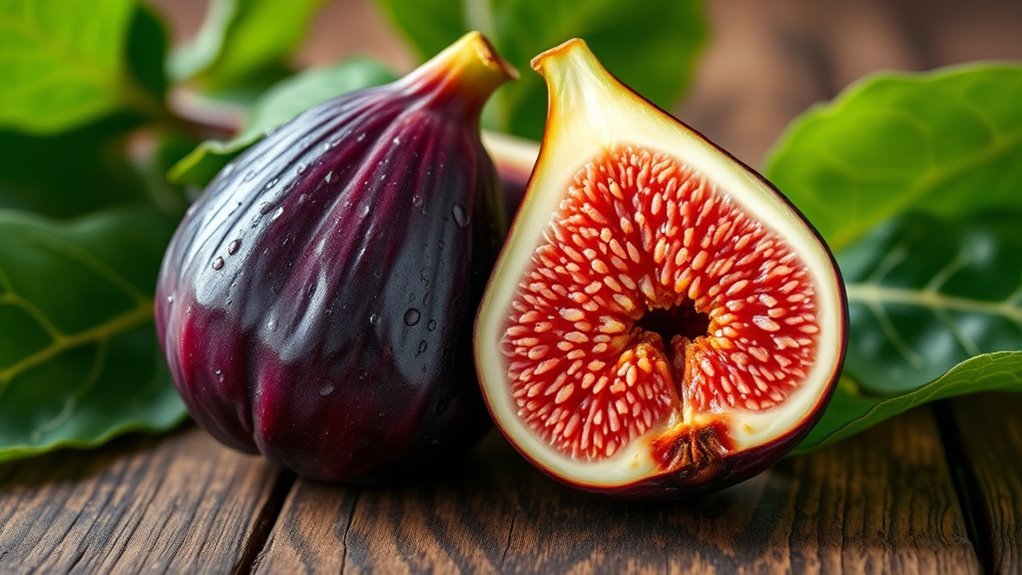Figs can be enjoyed on a keto diet, but you need to be cautious due to their high carb content—about 27 grams per 100 grams. This means you should consume them in moderation to avoid disrupting ketosis. A small serving can satisfy your sweet cravings without refined sugars, especially when paired with keto-friendly foods like cheese or nuts. If you’re curious about how to incorporate figs effectively while keeping your carb intake in check, there are plenty of tips ahead.
Nutritional Profile of Figs

When it comes to the nutritional profile of figs, these sweet fruits pack a surprising punch. You’ll find that fig varieties, such as Black Mission and Kadota, not only offer delightful flavors but also a host of nutrients. Figs are rich in dietary fiber, antioxidants, and essential vitamins like A, K, and several B vitamins. A typical serving of fresh figs (about two medium fruits) can provide around 37 calories, making them a guilt-free snack. For serving suggestions, consider adding figs to salads, cheeses, or even as a natural sweetener in smoothies. Their unique taste and texture can elevate both savory and sweet dishes, allowing you the freedom to explore diverse culinary creations.
Carbohydrate Content and Keto Considerations

While figs offer a wealth of nutrients, their carbohydrate content is a key consideration for those following a ketogenic diet. With approximately 27 grams of carbs per 100 grams, figs can be a significant carbohydrate source that may conflict with keto restrictions. If you’re aiming to maintain ketosis, it’s essential to be mindful of your daily carb intake. Incorporating figs into your diet could lead to exceeding your carb limit, especially since keto typically allows only about 20-50 grams of net carbs per day. If you’re craving something sweet, consider using figs sparingly or as an occasional treat. Balancing your carbohydrate sources is crucial to stay true to your keto lifestyle while still enjoying the occasional indulgence.
Health Benefits of Figs

Figs are packed with essential nutrients that can enhance your overall health, making them a valuable addition to your diet. Their antioxidant properties help combat oxidative stress, while their high fiber content supports digestive health. By understanding these benefits, you can make informed choices about incorporating figs into your meals.
Nutrient Density Overview
Although often overlooked in the world of superfoods, figs pack a powerful punch regarding nutrient density and health benefits. Their impressive fiber content supports digestive health, while their vitamin profile contributes to overall well-being. Including figs in your diet can offer you various benefits:
- High in dietary fiber, promoting gut health
- Rich in vitamins A, B, C, and K for immune support
- Contains essential minerals like potassium and magnesium
- Natural sweetness can satisfy sugar cravings without refined sugars
Antioxidant Properties Explained
Given their impressive array of antioxidants, incorporating figs into your diet can considerably enhance your health. Figs are rich in phytochemical compounds like flavonoids and phenolic acids, which provide significant antioxidant benefits. These compounds help combat oxidative stress by neutralizing free radicals, reducing inflammation, and potentially lowering the risk of chronic diseases. Studies suggest that the antioxidants found in figs can support heart health and may even improve blood sugar levels, making them a smart choice for those seeking a balanced diet. By adding figs to your meals or snacks, you’re giving your body a natural source of protection against cellular damage, promoting overall well-being while enjoying a delicious, versatile fruit. So, why not indulge in the goodness of figs?
Digestive Health Support
When it comes to supporting digestive health, figs offer a unique combination of dietary fiber and natural enzymes that can enhance your gut function. Their high fiber content helps regulate bowel movements and promotes a healthy gut flora, which is essential for overall digestive wellness.
Consider these key benefits of incorporating figs into your diet:
- Rich in fiber: Aids in digestion and prevents constipation.
- Supports gut flora: Helps maintain a balanced microbiome.
- Natural enzymes: Assist in breaking down food for better nutrient absorption.
- Hydration: Their natural moisture content keeps your digestive system running smoothly.
Incorporating Figs Into a Keto Diet
Incorporating figs into a keto diet can be a bit tricky, but it’s not impossible. You can enjoy figs in moderation by using them in creative fig recipes or as occasional keto snacks. Keep your portions small to manage your carb intake effectively.
Here’s a simple guide to help you:
| Serving Size | Carbs (g) | Enjoyment Level |
|---|---|---|
| 1 Fresh Fig | 8.8 | High |
| 1 Dried Fig | 20.4 | Moderate |
| 2 Fresh Figs | 17.6 | High |
With a little creativity, you can mix figs with keto-friendly ingredients, like cheese or nuts, making delightful treats that align with your keto goals. Enjoy the freedom of experimenting!
Alternatives to Figs for Keto Followers
While figs can be a delicious treat, they aren’t the best choice for those sticking strictly to a keto diet due to their higher carbohydrate content. Luckily, there are plenty of alternatives that fit perfectly within your low carb lifestyle. Consider these keto-friendly snacks and low carb fruits:
- Avocado: Packed with healthy fats and fiber, making it a filling option.
- Berries: Raspberries, strawberries, and blackberries are lower in carbs and high in antioxidants.
- Olives: These are a great savory snack, rich in healthy fats.
- Coconut: Unsweetened coconut flakes or coconut milk can add flavor and texture to your meals.
These options can keep your diet deliciously varied while remaining low in carbs. Enjoy exploring!
Final Thoughts on Figs and Keto
Although figs can be a delightful addition to your diet, it’s important to be mindful of their carbohydrate content if you’re following a strict keto regimen. While they offer numerous figs benefits, such as high fiber and antioxidants, their natural sugars can add up quickly. If you’re committed to a keto lifestyle, consider enjoying figs in moderation or as an occasional treat rather than a staple. This way, you can savor their unique flavor while staying within your carb limits. Remember, flexibility is key in any diet. Balancing enjoyment with nutritional goals can lead to a sustainable approach. If you’re craving something sweet, explore lower-carb fruits or alternatives that fit more seamlessly into your keto journey.
Frequently Asked Questions
Can I Eat Dried Figs on a Keto Diet?
You might want to limit your intake of dried figs on a keto diet. While they’re tasty and nutritious, they’re high in carbohydrates, which can interfere with ketosis. A small serving may fit into your carb count, but it’s essential to be mindful of portion sizes. If you enjoy dried figs, consider enjoying them occasionally and balance them with lower-carb foods to stay aligned with your keto goals. Moderation is key!
How Do Figs Compare to Other Fruits on Keto?
When you’re maneuvering through the keto landscape, figs can feel like a tempting oasis, but their sugar content makes them less ideal than other fruits. With about 47 grams of carbs per 100 grams, they pack a nutritional punch, yet that sweetness comes at a cost. Consider alternatives like berries or avocados for lower carb options. While figs have nutritious benefits, balancing your choices with fruit alternatives is key to staying on track!
Are There Any Keto-Friendly Fig Recipes?
Yes, there are keto-friendly fig recipes you can try! For fig desserts, consider making a low-carb fig tart using almond flour crust and sugar substitutes. You can also whip up fig smoothies by blending figs with unsweetened almond milk and a handful of spinach for added nutrients. Remember, moderation is key, so keep an eye on portion sizes to maintain your keto goals while enjoying these delicious options.
What Are the Side Effects of Eating Figs?
Eating figs can lead to some side effects, primarily digestive issues. While figs offer health benefits like fiber and antioxidants, consuming them in excess may cause bloating or diarrhea. Their high natural sugar content can also affect blood sugar levels, so moderation’s key. If you’re sensitive to fructose, you might experience discomfort. Balancing your intake can help you enjoy the benefits while minimizing any adverse effects. Just listen to your body!
Can Figs Cause Weight Gain on a Keto Diet?
Figs can potentially cause weight gain on a keto diet if consumed in excess. While they’re nutritious, their higher carbohydrate content can hinder weight loss efforts, especially if you’re looking for keto snacks. Moderation is key; a few figs might fit into your plan, but overindulging can lead to exceeding your carb limits. Focus on balancing your intake and consider low-carb alternatives to maintain your desired weight loss on keto.
-
1. Are figs keto-friendly?
-
Figs are generally not considered keto-friendly due to their relatively high carbohydrate content. A single medium-sized fig contains about 8 grams of carbohydrates, which can take up a significant portion of the daily carb limit on a ketogenic diet. For those strictly adhering to keto, it may be best to consume figs in moderation or avoid them altogether.
-
2. How many carbs are in figs?
-
Figs are relatively high in carbohydrates compared to many other fruits. On average, a medium-sized fig has about 8 grams of carbohydrates, which includes both sugars and fiber. Dried figs contain even more carbs due to the concentration of sugars, with about 20 grams of carbohydrates per serving.
-
3. Can I eat figs on a low-carb diet?
-
While figs may not be ideal for a strict ketogenic diet, they can be included in moderation on a low-carb diet depending on individual carb limits. It’s essential to monitor your overall carbohydrate intake for the day to ensure that it aligns with your dietary goals.
-
4. What are the health benefits of figs?
-
Figs offer several health benefits, including being rich in dietary fiber, which can aid digestion and promote a feeling of fullness. They also contain essential vitamins and minerals, such as vitamin B6, potassium, and magnesium. Additionally, figs are known to have antioxidant properties that can help combat oxidative stress.
-
5. What are some keto-friendly alternatives to figs?
-
If you’re looking for keto-friendly alternatives to figs, consider berries such as strawberries, raspberries, or blackberries, which are lower in carbohydrates. Other options include avocados, olives, and nuts, which provide healthy fats and fiber without significantly increasing carb intake.


